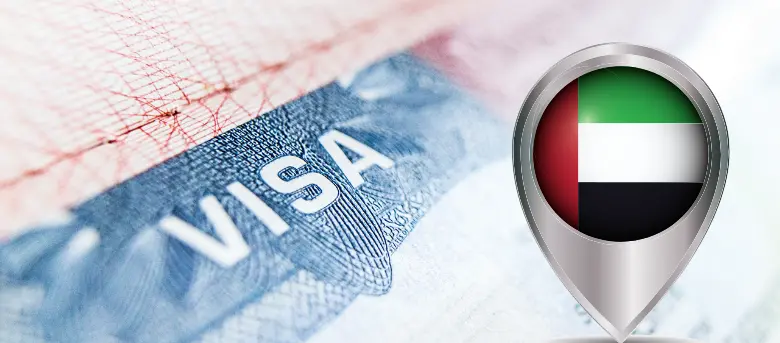If you’re considering moving to Dubai UAE, one of the most important things you’ll need to consider is to obtain a UAE residence visa. A residence visa entitles an individual to reside and work for a predetermined time, typically for 2 or 3 years. This authorization provides a foreigner with the official status of a resident in the UAE, allowing them to enjoy the perks of living and working in this vibrant and dynamic country.
The United Arab Emirates offers different kinds of visas to foreign nationals who want to live and work in the country. These visas are issued by the General Directorate of Residency and Foreigners Affairs GDRFA and are valid for a specific period. The most common type of visa is the residency visa, also known as a residence permit. There are several residence visas available, including those for investors, employees, students, and retirees.
In this post, we’ll cover everything you need to know about how to obtain a residency visa in Dubai and the wider UAE. From work permits to UAE long-term visas, we’ll break down the different visas available, the requirements, costs, and renewals of the visas.
I. Types of residence visas in Dubai UAE
A. Residence visa for working in the UAE
There are several types of residence visas for working in UAE, including the standard work visa, green visa for work, and domestic worker visa. The standard work visa is typically issued to individuals who will be employed in either government or private sectors. On the other hand, the green visa is issued for highly skilled employees and is typically a 5-year visa. Domestic worker visas or maid visas are issued to individuals who will be employed as domestic helpers.
B. Residency visa for working outside the UAE
Foreign workers who are employed outside the UAE have the opportunity to live in the country legally with the help of a virtual work visa. This one-year visa allows them to enter the UAE under self-sponsorship and work within the terms and conditions that come with the visa.
C. Residency visa in Dubai for the Retired individual
Individuals who are retired and above the age of 55 can apply for a long-term visa that is valid for five years. In addition to meeting the age requirement, other eligibility criteria must be satisfied. More details on visas for retired individuals can be found on the UAE Government u.ae website
D. Residency visa for entrepreneurs in Dubai UAE
The UAE offers the Green Visa for investors who wish to establish or participate in commercial activities in the emirate. This new type of residency permit replaces the previous two-year residence visa and is available to foreign investors who meet specific requirements to get a visa.
E. Residence visa for studying in the UAE
To acquire a UAE student visa, one must have a parent who is a resident of the UAE or be sponsored by an accredited university or college where they are enrolled. The process is facilitated by the Student Affairs offices at universities.
The student visa at the time is valid for one year and can be renewed upon proof of continuation of study from the educational institute. Male students over the age of 25 can stay on their parent’s sponsorship if they provide proof of attending a higher educational institute for at least one year. Female children of expatriate residents can be sponsored for study regardless of age until they are married.
To apply for a student visa, one needs to submit a certificate issued by the university or institute specifying the duration of the study along with other general requirements stated in the provisions for the residence visa. At the same time, a Golden visa is issued to outstanding students.
F. UAE Residence visa for immediate family members
UAE residence visa holders, including both employers and employees, can sponsor visas for families. Employees can now sponsor their families regardless of their job titles if they earn a minimum salary of AED 4,000 or AED 3,000 plus accommodation. All newcomers over the age of 18 must clear a medical fitness examination.
II. How to apply to obtain a UAE residence visa?
The process of applying to obtain UAE residency can vary depending on your specific circumstances, such as the reason for your stay (work, study, family sponsorship, etc.) and the emirate you are planning to reside in. However, here are some general steps that can help guide you through the process
- Obtain a valid passport: Your passport should have at least six months of validity from the date of your intended entry into the UAE.
- Secure a sponsor: You may need a UAE-based sponsor to apply for a residence visa. This could be your employer, a family member who is a UAE resident, or a local service agent if you plan to establish a company in the UAE.
- Apply for entry permit: Your sponsor can apply for an entry permit on your behalf through the (GDRFA) in the emirate you plan to reside in.
- Enter the UAE: Once your entry permit is approved, you can enter the UAE within a specific timeframe.
- Get a medical check-up and obtain a health card: All individuals applying for a residence visa need to undergo a medical examination and obtain a health card from a government-approved medical centre.
- Complete the residence visa application: After entering the UAE, you need to complete the residence visa application form and submit it, along with the required documents (such as your passport, Emirates ID application, and medical test results) to the GDRFA.
- Pay the fees: You will need to pay the applicable fees for the residence visa.
- Wait for approval: The processing time for a residence visa can vary, but it typically takes a few weeks. You can track the status of your application through the GDRFA’s online portal.
Once your residence visa is approved, you can collect it from the GDRFA and begin your stay in the UAE.
III. Documents required to obtain a UAE residency visa

A. Provide various supporting documents depending on the purpose of your stay. These may include:
- The UAE visa application form can be obtained online or through a typing centre.
- Your original passport, which should have at least six months of validity from the date of your intended entry into the UAE.
- Two passport-size photos that meet requirements.
- Proof of your sponsor’s legal residency or UAE citizenship, such as a visa copy or Emirates ID.
- A medical fitness certificate obtained from a government-approved medical centre.
- Proof of a valid UAE health insurance plan.
- For family visas, include proof of family ties such as birth or marriage certificates.
- For a work visa, your sponsor must include the work contract and copies of the company’s valid trade license and firm card.
- Any additional documents related to your purpose of travel, such as proof of enrollment for a student visa or proof of investment for an investment visa.
It’s important to note that the specific requirements may vary depending on the emirate you plan to reside in and the type of residence visa you are applying for. Therefore, it’s recommended to check with the relevant authorities or your sponsor for the most up-to-date and accurate information.
B. To obtain and prepare the necessary documents for a residence visa application in the UAE, follow these tips:
- Check the requirements: Before starting the application process to live in the UAE, check the requirements for your specific visa type. Make sure you have all the necessary documents and that they meet the requirements specified by the General Directorate of Residency and Foreigners Affairs.
- Get an Emirates ID: The Emirates ID is a mandatory identification card for all residents of the UAE. You will need to obtain one before applying for your residence visa. You can apply for an Emirates ID at any accredited typing centre.
- Provide proof of employment or investment: If you are applying for a work visa, you will need to provide proof of employment, such as a job offer letter or employment contract. If you are applying for an investor visa, you will need to provide proof of investment, such as a certificate of ownership or a bank statement.
- Obtain a medical examination report: You will need to undergo a medical examination at an approved medical centre in the UAE. The medical examination typically includes a blood test, a chest x-ray, and a test for communicable diseases.
- Prepare other supporting documents: Depending on your specific visa type, you may need to provide other supporting documents, such as proof of income, a tenancy contract, or educational certificates.
By following these tips, you can ensure that you have all the necessary documents prepared and ready to go when it comes time to submit your residence visa application in the UAE.
IV. Cost of obtaining a residence visa in the UAE
The cost to obtain a residency in Dubai can vary depending on the type of visa and the specific requirements of the applicant. Here are some different kinds of visa costs that you may encounter when applying for the visa:
- Visa application fee: This is a non-refundable fee that is paid when submitting your application.
- Entry permit fee: If you are applying for residency from outside the UAE, you will need to obtain an entry permit. The fee for an entry permit can vary depending on the kind of visa and the duration of your stay.
- Medical test fee: All applicants for a visa are required to undergo a medical test at a government-approved medical centre. The fee for this test can vary depending on the centre and the type of test required.
- Emirates ID fee: Once your visa is approved, you will need to obtain an Emirates ID. There is a fee for this ID, which can vary depending on the duration of the visa.
- Residence visa stamping fee: Once your application is approved, you will need to have your visa stamped in your passport. There is a fee for this stamping process.
It’s important to note that the specific fees associated with a visa can vary depending on your circumstances and the emirate you plan to reside in. It’s recommended to check with the relevant authorities or your sponsor for the most up-to-date information.
V. Renewing and maintaining a Dubai residence visa in the UAE
Once a foreigner has obtained a resident visa, they must meet certain requirements to maintain a visa valid. They need to renew the visa and work permit before it expires and pay the required processing fee. The visa is valid for a certain period, usually between two and three years, and can be renewed multiple times. Failure to renew the visa expired could result in fines and other penalties.
The process of renewing a residence visa in the UAE
It can vary depending on the emirate and the type of visa. Generally, to renew your residence, you will need to:
- Submit an application for renewal at the GDRFA-approved typing centre.
- Provide the required documents, such as a valid passport, passport-size photos, and proof of valid Emirates ID.
- Undergo a medical examination and obtain a health certificate from an authorized medical centre in the UAE.
- Obtain a valid UAE health insurance policy.
- Pay the renewal fee, which varies depending on the emirate and the type of visa.
To avoid visa expiration, it is advisable to stay up-to-date with the requirements and renewable visa dates. UAE and GCC residents can check their status and renewal dates on the official website of the General Directorate of residency and Foreign Affairs. It is also recommended to keep track of any changes in visa regulations and requirements that may affect the application or renewal process.
The Emirates offers various visa options for foreigners, including long-term residence visas for investors and entrepreneurs, and remote work and tourist visas, among others. The visa options and requirements may change from time to time, and it is crucial to stay informed to make the best decision regarding visa application and renewal.
By staying informed and complying with the visa regulations, foreigners can live and work legally and enjoy the benefits of being UAE residents.
FAQs – Residency in Dubai and UAE Visa
How long can I stay with a UAE Residence Visa?
With a valid UAE residence visa, you can stay in the country for a period of two or three years, which can be renewed. Depending on the visa you hold, such as a 10-year visa, a long-term or a remote work visa, you may stay for a longer period. To obtain or renew a residence visa, you must meet the requirements set by the General Directorate of Residency and Foreigners Affairs, which vary depending on your situation.
How long does it take to get a UAE residence visa?
Getting a valid residence visa to the UAE can take anywhere between a few days to a few weeks. The time taken to acquire a residence visa can depend on multiple factors such as the kind of visa being applied for, the sponsor’s status, the country of origin, and the completeness of the visa application. If the application is complete and all documents are in order, it can take anywhere between 1 to 4 weeks for the visa to be processed.
However, if the application is incomplete or additional documents are required, this timeline can be extended by a few weeks. Individuals need to ensure that they have all the necessary documents and meet the eligibility criteria for their chosen visa type to avoid any delays in the process.
How much do I need to invest in getting a residence visa in UAE?
The expenses associated with obtaining a residency permit in the UAE are determined by various factors, including the type of permit, length of stay, the emirate of application, and the sponsoring entity. The most common types of permits are for employment, investment, dependents, and property investment. The cost of an employment permit may vary depending on the company’s size, industry, and position held by the employee.
To obtain an investor permit, a minimum investment of AED 10 million ($2.7m) is required. To be eligible for a dependent permit, the sponsor must earn a minimum monthly salary of AED 4,000 ($1,088), and for a property investor permit, a minimum investment of AED 1 million ($272,000) in property in Dubai is required. Aside from the permit fee, other expenses such as medical examinations, Emirates ID, and visa stamping charges also need to be considered.
Can a foreigner get UAE citizenship?
It is not easy for a foreigner to obtain UAE citizenship. The government has strict rules and regulations in place for naturalization. Foreigners must have continuously resided in the UAE for at least 30 years and must not have been outside the country for more than 6 months at a time. Also, they must have a valid UAE residence permit, be able to speak Arabic and have a good standing in the community.
However, there are some exceptions for individuals who have contributed in a significant way to the country’s development or have made outstanding achievements in various fields. They may be granted citizenship by the government on a case-by-case basis. But, in general, citizenship in the UAE is reserved for Emirati nationals only.
What Happens If I Leave The UAE For More Than 6 Months?
If you leave the UAE for more than 6 months, your visa may become invalid. This means that you will not be allowed to enter the country until you have obtained a fresh entry permit. However, certain individuals may be eligible for a grace period to return and renew their visas. The length of the grace period can vary depending on your visa type and the duration of your absence.
It is important to note that employers may also cancel your employment visa if you are absent from work for an extended period without their permission. Upon your return, you may be required to take a medical exam and provide a new set of fingerprints. It is advisable to check with relevant authorities and your employer before leaving the UAE for an extended period.
Difference between an entry permit and a residence visa in Dubai UAE?
An entry permit is a temporary document that allows individuals to enter Dubai for a specific purpose and duration, such as tourism, business, or medical treatment. A residence visa, on the other hand, allows individuals to reside in Dubai for a longer period, usually for employment or family sponsorship.
It requires sponsorship from a UAE national or a company and involves a more extensive application process, including medical tests and background checks. An entry permit is valid for a short time(60 days), whereas a residence visa is valid for 2 to 3 years and can be renewed as long as the individual meets the requirements.
Conclusion to Obtain Residency in Dubai
In conclusion, obtaining a Dubai residency visa can seem complex, but the process can be straightforward if you follow the proper steps. This ultimate guide has provided you with a comprehensive overview of the requirements, documentation, fees, and procedures for obtaining your UAE residence visa. With the information in this guide, you can confidently navigate the process and take the necessary steps toward obtaining your visa.
Whether you are going to the UAE for work, study, or to be with family, the country offers many opportunities and benefits for residents. By obtaining your visa, you can take advantage of these opportunities and enjoy life in the exciting and innovative UAE. So, take the time to carefully review this guide, gather your documents, and get yourself ready for an exciting new chapter in the UAE.


